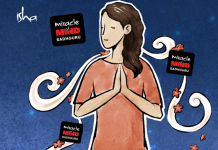“Open wide … here comes the choo-choo.”
When it comes to giving children medicine, a little imagination never hurts.
But what’s more important is vigilance: giving the medicine at the right time at the right dose, avoiding interactions between drugs, watching out for tampering, and asking your child’s doctor or the pharmacist about any concerns you may have.
Whether it’s a prescription or over-the-counter (OTC) drug, dispensing medicine properly to children is important. Given incorrectly, drugs may be ineffective or harmful.
Read the Label
The most important thing for parents is to know what the drug is, how to use it, and what reactions to look for. A parent should ask the doctor or pharmacist a number of questions before accepting any prescription:
- What is the drug and what is it for?
- Will there be a problem with other drugs my child is taking?
- How often and for how long does my child need to take it?
- What if my child misses a dose?
- What side effects does it have and how soon will it start working?
It’s also a good idea to check the prescription after it has been filled. Does it look right? Is it the color and size you were expecting? If not, ask the pharmacist to explain.
Check for signs of tampering in any OTC product. The safety seal should be intact before opening. Also, parents should be extra careful to read the label of over-the-counter medicines.
Read the label, and read it thoroughly, as there are many warnings on there, and they were written for a reason. Don’t use the product until you understand what’s on the label.
Make sure the drug is safe for children. This information will be on the label. If the label doesn’t contain a pediatric dose, don’t assume it’s safe for anyone under 12 years old. If you still have questions, ask the doctor or pharmacist.
Children are more sensitive than adults to many drugs. Antihistamines and alcohol, for example, two common ingredients in cold medications, can have adverse effects on young patients, causing excitability or excessive drowsiness. Some drugs, like aspirin, can cause serious illness or even death in children with chickenpox or flu symptoms. Both alcohol and aspirin are present in some children’s medications and are listed on the labels.





